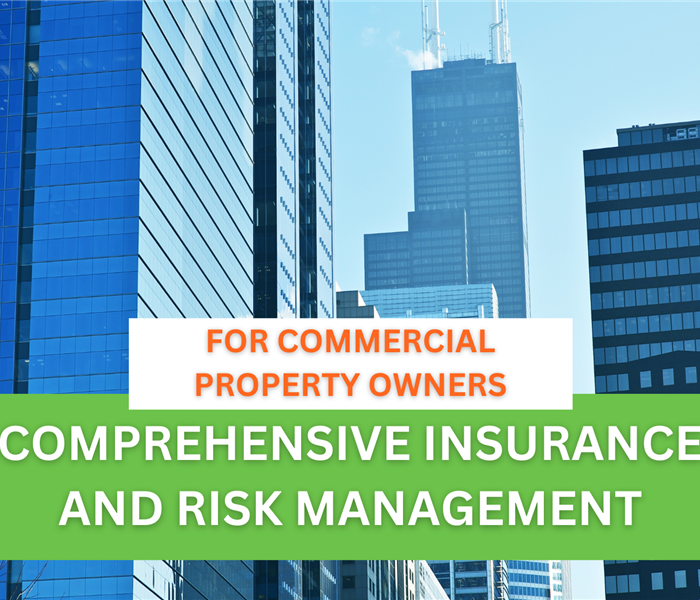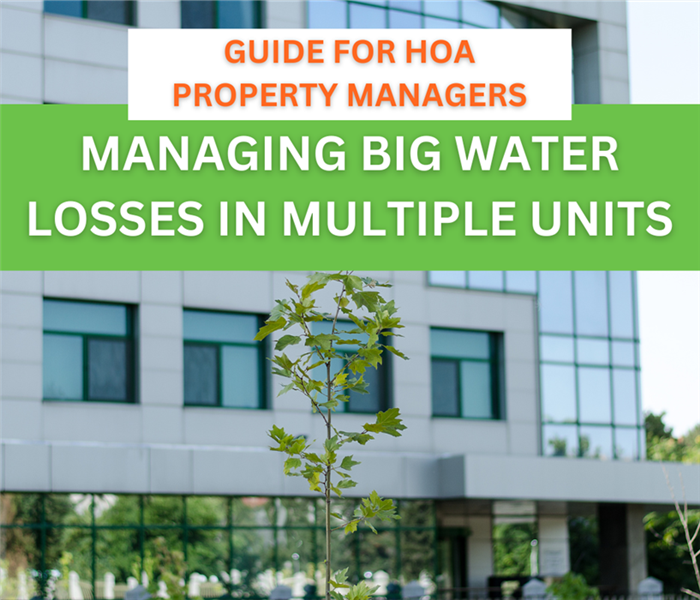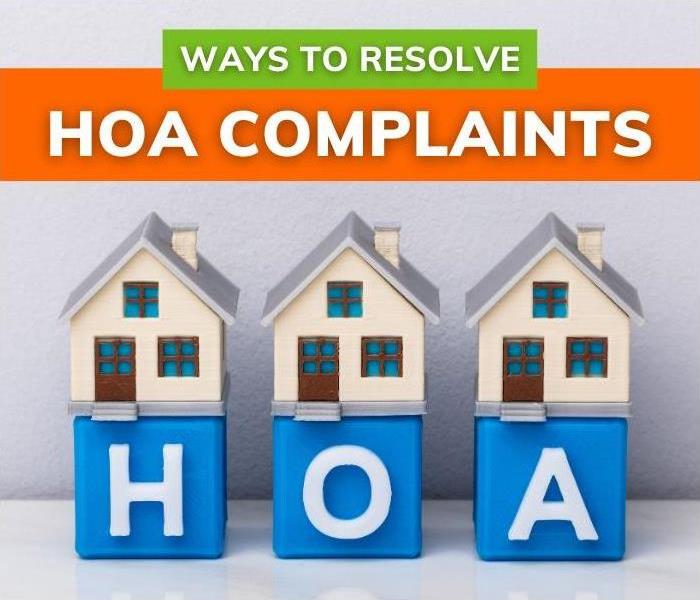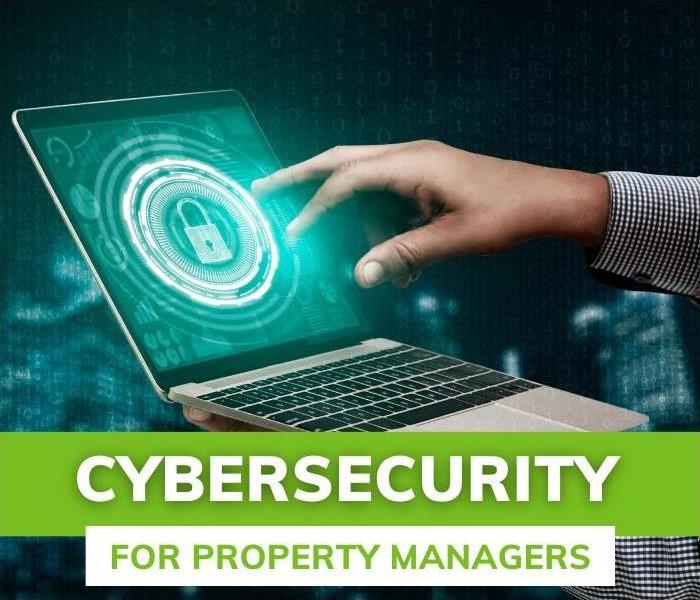Recent Posts
The Rising Importance of Cybersecurity in Property Management
8/23/2024 (Permalink)
 Cybersecurity for property managers
Cybersecurity for property managers
The Rising Importance of Cybersecurity in Property Management
As property management increasingly integrates digital tools and cloud-based solutions, the need for robust cybersecurity measures has become more critical than ever. With tenant information, financial data, and property details stored online, property managers must prioritize safeguarding this sensitive information against cyber threats. Understanding the risks and implementing best practices can help protect your business and the tenants who rely on you.
Why Cybersecurity Matters in Property Management
The shift towards digitalization in property management brings numerous benefits, such as streamlined processes, enhanced communication, and better access to data. However, it also introduces new vulnerabilities. Cyberattacks, data breaches, and unauthorized access to sensitive information can result in significant financial losses, legal liabilities, and reputational damage. For property managers, the stakes are particularly high due to the trust placed in them by tenants and property owners to protect their data.
Common Cyber Threats in Property Management
Phishing Attacks: Cybercriminals often use phishing emails to trick property managers or staff into revealing sensitive information, such as login credentials or financial data. These emails can appear legitimate, making them difficult to spot.
Ransomware: Ransomware is a type of malware that encrypts data, making it inaccessible until a ransom is paid. For property management companies, this could mean losing access to important tenant records, financial documents, and more.
Data Breaches: Unauthorized access to cloud-based systems can lead to data breaches, where hackers steal sensitive information. This can include tenant personal information, financial records, and property details.
Weak Passwords: Many cyberattacks succeed due to weak or reused passwords. Property managers often handle multiple accounts and systems, increasing the risk if proper password protocols are not followed.
Best Practices for Enhancing Cybersecurity
To mitigate these risks, property managers should adopt a proactive approach to cybersecurity. Here are some best practices to consider:
Educate Your Team: Regular training on cybersecurity threats and how to recognize them is essential. Ensure that all staff members understand the importance of not clicking on suspicious links, recognizing phishing attempts, and reporting any unusual activity.
Use Strong, Unique Passwords: Implement a password management system that encourages the use of strong, unique passwords for all accounts. Two-factor authentication (2FA) adds an extra layer of security.
Regularly Update Software: Ensure that all digital tools and software are regularly updated with the latest security patches. Outdated software can have vulnerabilities that hackers can exploit.
Encrypt Sensitive Data: Encrypting data, both in transit and at rest, ensures that even if it is intercepted, it cannot be easily accessed or read by unauthorized parties.
Implement Access Controls: Limit access to sensitive information based on the role of each team member. Not everyone needs access to all data, and minimizing access reduces the risk of insider threats.
Backup Data Regularly: Regular data backups can help you recover quickly in the event of a ransomware attack or other data loss incidents. Ensure that backups are stored securely and tested regularly.
Monitor Systems Continuously: Use cybersecurity tools to continuously monitor your systems for unusual activity or potential breaches. Early detection can prevent a small issue from becoming a major problem.
Cybersecurity: An Ongoing Commitment
Cybersecurity is not a one-time effort but an ongoing commitment to protecting your property management operations. By staying informed about the latest threats and adopting best practices, property managers can create a safer environment for their business, tenants, and property owners.
How Strategic Home Improvements Can Make a Big Difference For Real Estate Agents
8/12/2024 (Permalink)
 Increasing ROI with home improvements
Increasing ROI with home improvements
As a real estate agent, you understand the importance of presenting properties in the best possible light. Homebuyers are not just looking for a place to live; they are seeking a lifestyle upgrade, which often hinges on the perceived value of the property. In today's competitive market, guiding your clients on which home improvements will yield the highest return on investment (ROI) can be a game-changer. But what if these improvements could also mitigate potential property damage? That's where we, as a property damage restoration company, can help.
The Power of First Impressions: Curb Appeal
Curb appeal is one of the most critical factors in real estate. A well-maintained exterior can significantly boost a home's market value. Simple upgrades like fresh paint, updated landscaping, and clean, repaired gutters can make a big difference. However, these improvements aren't just about aesthetics. Well-maintained gutters and proper drainage systems, for example, prevent water damage—a common issue that can significantly reduce property value. By ensuring these systems are in top shape, you not only enhance curb appeal but also protect the home from future water-related problems.
Kitchen and Bathroom Upgrades: High ROI and Damage Prevention
Kitchens and bathrooms are often the focus of home improvement projects because they tend to offer the highest ROI. Upgrading countertops, cabinets, and fixtures can make these spaces more appealing to potential buyers. However, these areas are also prone to water damage, especially if plumbing systems are outdated or improperly installed.
As a restoration company, we can offer more than just surface-level improvements. We inspect and repair any underlying issues that could lead to leaks or water damage. This not only ensures that the renovations will last longer but also provides peace of mind to your clients, knowing that their investment is protected.
Energy-Efficient Upgrades: Appealing to Modern Buyers
Today's buyers are increasingly eco-conscious and interested in energy-efficient homes. Recommending upgrades like energy-efficient windows, insulation, and HVAC systems can make a property more attractive. These improvements not only lower utility bills but also reduce the likelihood of damage related to poor insulation, such as mold growth or structural issues caused by temperature fluctuations.
We can assist by ensuring that these upgrades are installed correctly and by addressing any existing damage that could undermine their effectiveness. This dual approach maximizes the ROI on these improvements and enhances the overall appeal of the property.
The Hidden Value of Preventative Maintenance
While aesthetic upgrades grab attention, preventative maintenance plays a crucial role in maintaining—and even increasing—property value. Recommending that your clients invest in regular inspections and timely repairs can prevent minor issues from becoming major, costly problems. As experts in property restoration, we can partner with you to offer comprehensive maintenance plans that include everything from water damage prevention to mold remediation and beyond.
By combining your real estate expertise with our restoration services, we can ensure that the properties you represent are not only visually appealing but also structurally sound and free from potential hazards. This holistic approach to property improvement not only boosts market value but also instills confidence in buyers, making the sale process smoother and more successful.
Partner with Us for Optimal Results
At SERVPRO of Alhambra, we understand the challenges real estate agents face in today's market. Our goal is to provide services that not only restore properties after damage but also prevent issues from occurring in the first place. By working together, we can ensure that your clients' homes are in the best possible condition, maximizing their value and appeal to potential buyers.
Let’s collaborate to turn every property into a dream home, free from hidden risks and full of potential. Contact us today to learn more about how our services can complement your real estate efforts.
Summer Maintenance Tips for Commercial Property Owners
7/29/2024 (Permalink)
 Keeping a property maintained during the summer.
Keeping a property maintained during the summer.
Summer Maintenance Tips for Commercial Property OwnersAs summer rolls in, commercial property owners face unique maintenance challenges that can impact the value and functionality of their buildings. At SERVPRO of Alhambra, we understand the importance of proactive maintenance to prevent costly repairs and ensure the safety and comfort of your tenants. Here are some essential summer maintenance tips to help you keep your commercial property in top shape.
HVAC System Maintenance
Regular Inspections and Servicing The summer heat can put a significant strain on your HVAC system. Schedule regular inspections and servicing to ensure it operates efficiently. Clean or replace filters, check for refrigerant leaks, and inspect the ductwork for any signs of wear or damage.
Thermostat Settings Ensure that thermostats are set to optimal temperatures to maintain a comfortable environment for tenants while also conserving energy. Consider upgrading to programmable thermostats for better temperature control and energy savings.
Roof Inspection and Repair
Check for Damage Summer storms can take a toll on your roof. Inspect for any signs of damage, such as missing shingles, leaks, or cracks. Promptly address any issues to prevent further damage and costly repairs.
Clean Gutters and Drains Clogged gutters and drains can lead to water damage. Regularly clean them to ensure proper water flow and prevent water from pooling on the roof or around the foundation.
Landscaping and Exterior Maintenance
Trim Trees and Shrubs Overgrown trees and shrubs can pose a risk to your property during summer storms. Trim them back to prevent branches from damaging the building or blocking emergency exits.
Inspect Irrigation Systems Ensure that your irrigation system is working correctly and efficiently. Check for leaks, broken sprinkler heads, and proper water coverage to keep your landscaping healthy without wasting water.
Safety and Security Measures
Inspect Lighting Proper lighting enhances security and safety. Check all exterior and interior lighting to ensure they are functioning correctly. Replace any burnt-out bulbs and consider upgrading to energy-efficient LED lights.
Review Security Systems Summer often sees an increase in property crimes. Review your security systems, including cameras, alarms, and access controls, to ensure they are in good working order.
Interior Maintenance
Check for Water Damage Inspect your property for any signs of water damage, such as stains on ceilings or walls, mold growth, or musty odors. Address any issues immediately to prevent further damage and potential health hazards.
Plumbing Inspections Summer can strain plumbing systems, especially in properties with increased water usage. Inspect pipes, faucets, and toilets for leaks or signs of wear. Regular maintenance can prevent costly repairs and water damage.
Energy Efficiency Upgrades
Install Energy-Efficient Windows Consider upgrading to energy-efficient windows to reduce heat gain and lower cooling costs. This investment can also improve tenant comfort and reduce your property's carbon footprint.
Seal Doors and Windows Inspect and seal any gaps around doors and windows to prevent cool air from escaping and hot air from entering. Proper sealing can enhance energy efficiency and reduce utility bills.
Emergency Preparedness
Update Emergency Plans Summer storms can lead to power outages, flooding, and other emergencies. Review and update your emergency preparedness plans, including evacuation routes, emergency contacts, and communication strategies.
Stock Emergency Supplies Ensure that your property is equipped with essential emergency supplies, such as first aid kits, flashlights, batteries, and non-perishable food items. Regularly check and replenish supplies as needed.
Partner with SERVPRO of Alhambra
At SERVPRO of Alhambra, we specialize in helping commercial property owners maintain their buildings and address any restoration needs. From water damage and mold remediation to fire and storm damage restoration, our team of experts is here to support you.
By following these summer maintenance tips, you can protect your commercial property, enhance tenant satisfaction, and avoid costly repairs. For more information on our services or to schedule a consultation, contact SERVPRO of Alhambra today.
The Impact of Wildfires on Properties and How Homeowners Can Address Soot Damage
6/20/2024 (Permalink)
 Homeowners guide to addressing soot/smoke damage to their properties.
Homeowners guide to addressing soot/smoke damage to their properties.
Wildfires can cause widespread devastation, affecting entire communities and leaving behind significant damage to properties. Even if your home survives the flames, the aftermath of a wildfire can still pose serious risks. One of the most common issues homeowners face after a wildfire is soot damage. Here, we explore the effects of wildfires on properties and provide actionable steps for homeowners dealing with soot damage.
The Effects of Wildfires on Properties
- Structural Damage: While direct fire damage is the most obvious threat, the heat generated by wildfires can weaken structural components of buildings, making them unsafe.
- Smoke Damage: Smoke can infiltrate homes, leaving behind a persistent odor and potentially harmful residues on walls, ceilings, and furnishings.
- Soot Damage: Soot is composed of tiny carbon particles that can settle on surfaces throughout a home, causing discoloration, corrosion, and health hazards.
- Water Damage: Efforts to extinguish wildfires often involve large amounts of water, which can lead to water damage in homes, further complicating the cleanup process.
- Air Quality Issues: The fine particles in smoke and soot can degrade indoor air quality, posing respiratory risks, particularly to vulnerable populations like children, the elderly, and those with preexisting health conditions.
Actions Homeowners Need to Take for Soot Damage
If you suspect your home has suffered soot damage after a wildfire, it’s crucial to act promptly to mitigate further damage and health risks. Here are the steps to take:
Ensure Safety First: Before re-entering your home, ensure it has been declared safe by local authorities. Wear protective gear such as masks, gloves, and goggles to avoid inhaling or coming into contact with hazardous particles.
Assess the Damage: Perform a thorough inspection to identify areas affected by soot. Look for discoloration on walls, ceilings, and furniture, and check for a lingering smoke odor.
Contact Your Insurance Company: Notify your insurance company about the damage as soon as possible. Document the damage with photos and detailed notes to support your claim.
Ventilate Your Home: Improve air circulation by opening windows and using fans to help clear out lingering smoke and soot particles. Air purifiers with HEPA filters can also help improve indoor air quality.
Avoid DIY Cleaning: Soot cleanup requires specialized knowledge and equipment. Attempting to clean it yourself can spread particles and potentially cause more harm. Instead, contact a professional restoration company experienced in soot and smoke damage.
Professional Cleaning and Restoration:
- SERVPRO® Soot Removal: Professionals at SERVPRO use industrial-grade vacuums and specialized cleaning agents to remove soot from surfaces. They have the expertise to clean various materials without causing further damage.
- SERVPRO Odor Removal: SERVPRO uses techniques like thermal fogging, ozone treatment, and hydroxyl generators to eliminate smoke odors from your home.
- SERVPRO Air Duct Cleaning: Soot and smoke particles can accumulate in your HVAC system. SERVPRO's professional cleaning ensures that your air ducts are free of contaminants, preventing them from being recirculated throughout your home.
Evaluate and Replace Damaged Items: Some items, especially porous materials like upholstered furniture, carpets, and clothing, may need to be replaced if they are heavily contaminated with soot and smoke. SERVPRO can assist with the evaluation and cleaning or replacement of these items.
Implement Preventative Measures:
- Fire-Resistant Landscaping: Create defensible space around your property by using fire-resistant plants and materials.
- Home Hardening: Upgrade your home with fire-resistant building materials, such as metal roofing and fire-resistant siding, to reduce future wildfire risks.
- Emergency Preparedness: Develop and practice a wildfire evacuation plan. Keep an emergency supply kit on hand and stay informed about local wildfire risks and warnings.
Conclusion
Wildfires are a formidable natural disaster, but understanding the potential impacts on your property and knowing how to address soot damage can help you recover more effectively. Acting swiftly and enlisting professional help, such as that provided by SERVPRO of Alhambra, are crucial steps in restoring your home to its pre-fire condition while ensuring the safety and well-being of your family. Stay informed, prepared, and proactive to protect your home from the ongoing threat of wildfires.
Comprehensive Insurance and Risk Management for Commercial Property Owners
6/13/2024 (Permalink)
 Commercial property insurance and risk management
Commercial property insurance and risk management
Protecting your commercial property against potential risks is crucial. Understanding insurance options and implementing effective risk management strategies ensures your investments remain secure and stable. Here’s a brief guide to key insurance types and risk management strategies, along with how our restoration services can help.
Commercial Property Insurance:
- Property Insurance: Covers physical damage due to fire, theft, and certain natural disasters.
- Liability Insurance: Protects against claims of injury or property damage on your premises.
- Business Interruption Insurance: Compensates for lost income if operations are halted due to a covered event.
- Flood and Earthquake Insurance: Specific coverage for damages caused by floods or earthquakes, essential for high-risk areas.
Risk Management Strategies:
- Regular Property Inspections: Identifies potential hazards early to prevent major issues.
- Safety Protocols and Training: Reduces accidents and injuries, enhancing overall safety.
- Emergency Preparedness Plans: Ensures organized responses to emergencies, minimizing damage.
- Maintenance and Upgrades: Regular upkeep of property systems to prevent failures and enhance value.
How Our Restoration Services Help:
- Damage Assessment and Restoration: Quick, comprehensive restoration minimizes downtime.
- Preventative Maintenance Programs: Regular inspections to catch issues early.
- Disaster Response Planning: Customized plans to ensure preparedness for emergencies.
Effective insurance and risk management protect your commercial property investments. Our restoration services support these efforts, ensuring property resilience and stability. Contact us to learn how we can help safeguard your investments.
Navigating the Commercial Real Estate Market
4/30/2024 (Permalink)
 Commercial Real Estate Market
Commercial Real Estate Market
As a commercial property owner, staying ahead in the dynamic real estate market is crucial for maximizing returns and making informed investment decisions. In this blog, we'll delve into the intricacies of commercial real estate market analysis, offering insights and strategies to help property owners navigate this complex landscape effectively.
Understanding Market Trends: The commercial real estate market is influenced by various factors such as economic conditions, industry trends, and local market dynamics. Property owners must stay updated with market trends, vacancy rates, rental trends, and emerging opportunities in their target areas.
Utilizing Market Data: Access to comprehensive market data is essential for informed decision-making. Property owners can leverage tools like market reports, property valuation services, and real-time analytics to assess property performance, benchmark against competitors, and identify areas for improvement.
Analyzing Investment Opportunities: Market analysis enables property owners to evaluate investment opportunities strategically. By assessing factors like cap rates, cash flow projections, and potential risks, owners can make sound investment decisions that align with their financial goals and risk tolerance.
Adapting to Market Changes: The real estate market is dynamic, and property owners must be adaptable to market changes. This includes adjusting leasing strategies, optimizing property management practices, and exploring new growth opportunities based on evolving market conditions.
Strategic Portfolio Management: Effective market analysis is integral to strategic portfolio management. Property owners can optimize portfolio performance by diversifying assets, optimizing property mix, and proactively addressing market challenges to enhance long-term portfolio value.
Navigating Regulatory Landscape: Market analysis also involves understanding regulatory changes and compliance requirements that impact commercial real estate. Property owners must stay abreast of zoning laws, tax implications, and regulatory updates to ensure legal and financial compliance.
Building Strategic Partnerships: Collaborating with industry experts such as real estate advisors, property managers, and financial consultants can enhance market analysis capabilities. These partnerships provide access to specialized knowledge, market insights, and strategic guidance to optimize property performance.
Navigating the commercial real estate market requires a combination of data-driven analysis, strategic planning, and proactive decision-making. By leveraging market insights, adapting to changes, and building strategic partnerships, property owners can position themselves for success in an ever-evolving market landscape.
Managing Big Water Losses in Multiple Units: A Guide for HOA Property Managers
4/23/2024 (Permalink)
 How to deal with water losses in multiple units as an HOA property manager.
How to deal with water losses in multiple units as an HOA property manager.
Water damage can wreak havoc on multiple units within a homeowners association (HOA), posing significant challenges for property managers. From burst pipes to flooding incidents, these emergencies demand swift and effective action to minimize damage and restore normalcy for residents. In such situations, partnering with professional restoration services like SERVPRO of Alhambra can be a game-changer. Let's explore what HOA property managers can do when faced with big water losses across multiple units and how they can leverage SERVPRO's expertise for comprehensive restoration.
Assessing the Extent of Damage
- The first step for HOA property managers is to assess the extent of water damage across affected units. This involves identifying the source of water intrusion, evaluating structural damage, and documenting the affected areas.
Implementing Immediate Mitigation Measures
- Time is of the essence in water damage scenarios. Property managers should quickly implement mitigation measures such as shutting off water mains, addressing any electrical hazards, and extracting standing water to prevent further damage.
Communicating with Residents
- Clear and timely communication with residents is crucial. Property managers should inform affected residents about the situation, safety measures, and temporary relocation options if necessary. Providing updates throughout the restoration process helps maintain trust and transparency.
Coordinating with Insurance Providers
- HOA property managers should liaise with insurance providers to initiate the claims process promptly. Documenting the damage, expenses, and restoration efforts is essential for a smooth claims experience.
Engaging Professional Restoration Services
- Partnering with a reputable restoration company like SERVPRO of Alhambra streamlines the restoration process. SERVPRO's experienced technicians can handle everything from water extraction and drying to mold remediation and structural repairs, ensuring comprehensive restoration from start to finish.
Customized Restoration Plans
- SERVPRO® works closely with HOA property managers to develop customized restoration plans tailored to each affected unit's unique needs. This includes prioritizing critical areas, coordinating scheduling for efficient work progress, and adhering to industry standards for quality assurance.
Utilizing Advanced Technologies
- SERVPRO employs advanced technologies and equipment for efficient water extraction, drying, and restoration. From moisture meters to thermal imaging cameras, these tools enable precise assessment and thorough restoration, minimizing downtime and disruption for residents.
Ensuring Compliance and Safety
- Compliance with regulatory requirements and safety protocols is paramount during the restoration process. SERVPRO of Alhambra adheres to industry best practices and safety standards, providing peace of mind to property managers and residents alike.
Monitoring and Follow-Up
- After the restoration work is completed, ongoing monitoring and follow-up inspections ensure that all affected units are fully restored and free from lingering issues like mold or structural damage. SERVPRO's commitment to customer satisfaction extends beyond the initial restoration phase.
Educating and Planning for Future Emergencies
- HOA property managers can leverage the experience gained from dealing with water losses to educate residents about preventive measures and emergency preparedness. Developing comprehensive emergency response plans and conducting regular maintenance checks can mitigate future risks.
By proactively managing big water losses in multiple units and partnering with trusted restoration professionals like SERVPRO of Alhambra, HOA property managers can navigate challenges effectively, minimize disruptions for residents, and restore properties to preloss conditions efficiently.
Effective Ways to Resolve HOA Complaints
2/19/2024 (Permalink)
 Transform your approach to handling HOA disputes with our detailed guide.
Transform your approach to handling HOA disputes with our detailed guide.
Living in a homeowners' association (HOA) managed community offers residents many benefits but is not without challenges. From parking issues to abandoned doggy doo in shared areas and other problems, the variety of complaints covers a lot of ground. When residents express their grievances to the HOA, each complaint warrants communication, careful consideration, and effective strategies to resolve the issues. When the HOA board focuses on how to resolve HOA complaints instead of ignoring or minimizing them, the result is a better community for everyone.
Parking Issues
In some HOA communities, street parking may be in short supply, causing complaints about the limited parking spot availability. Sometimes, people park on the streets in ways that block neighboring driveways. Residents may also park their cars in guest spots instead of their driveway or garage. They might also park an extra, rarely-used vehicle on the street and not move it for extended periods. Finally, unauthorized vehicles that don't seem to belong to residents, but take up valuable street or guest parking, also trigger complaints.
HOAs must provide clear signage to state the community’s rules for parking and enforce those rules or regulations consistently for them to have an effect. Other potential solutions include adding more parking areas designated for guests or issuing parking permits to monitor and effectively manage community parking.
Noise Problems
Neighbors can disrupt the peace by generating excessive noise, from loud music late at night to using noisy equipment in their yard or garage early in the morning. Another common complaint is continual barking from dogs who spend much time in the backyard.
When considering how to resolve HOA complaints about noise, HOAs can establish specific quiet hours for the community and encourage respectful communication between neighbors to resolve issues. Consider implementing a formal process for residents to lodge noise complaints for repeat disturbances.
Problems with Pets
The barking dog is cliché, but many other complaints also come up about neighborhood dogs. Some residents like to walk their dogs off-leash, which can endanger other pets, especially smaller breeds. Some neighbors do not pick up after their pets and leave pet feces on neighbors’ lawns or in common areas for others to deal with.
To resolve these complaints, establish pet regulations and enforce them consistently. Consider installing pet waste-bag stations with trash cans in key areas so residents can use tools to clean up after their pets. In the community newsletter, offer training resources and educational articles to inform pet owners and consider a program to require pet registration.
Neglected Maintenance
Residents may become concerned and lodge complaints if they feel the community upkeep is not up to par, such as overgrown common-area landscaping that blocks walkways, burned-out lights left unrepaired, and buildings with dirty or aged exteriors.
To resolve these issues, put maintenance on a regular schedule and include routine inspections. Promptly handle issues reported by residents and ensure that the HOA can cover maintenance costs by allocating sufficient budget dollars to the community’s upkeep.
Architectural Violations
Neighbors often complain when they see a resident changing their property without proper approval. These alterations can include unauthorized plantings in the front yard or paint colors that are not on the “approved” list. It also includes any structural modifications that have not received approval. For example, a homeowner may add a deck to their house without adhering to the HOA’s defined guidelines.
To resolve these complaints, the HOA can educate residents on the appropriate architectural guidelines for the community. It can also provide homeowners with resources and steps to get approval for home modifications. Conduct regular inspections and institute penalties for any violations to enforce compliance with the guidelines.
Misuse of Community Amenities
This common complaint usually involves reports of community amenities being abused or misused. Examples include residents having parties in common areas without getting proper approval or non-residents using pool and barbecue areas or the community clubhouse without prior permission. Some communities with locked pool areas have issues with residents making key copies for non-residents and their children to use the pool.
To resolve these complaints, the HOA must monitor the amenities regularly to enforce HOA rules. To prevent misuse and keep non-residents from accessing the amenities, consider a reservation system and access controls such as keys or key cards where possible. Use an electronic lock to track which keys are used to access the areas, and assign serial numbers to keys to prevent duplication.
Neighbor Disputes
Conflicts between neighbors can trigger complaints, such as disagreements over shared areas, property boundary disputes, and noise issues. After a disaster situation, such as a fire that involves more than one home, the HOA, and homeowners may have disputes over which insurance company should cover the fire damage and safety concerns that arise during fire restoration work, such as who covers the costs, work delays and questions about the work quality.
When resolving HOA complaints, maintaining open, clear, and transparent communication is the best way to minimize disputes and misunderstandings. The HOA can offer mediation services and other resources for neighbors with difficulties resolving a dispute amicably. Communication is also key for issues such as fire restoration involving multiple homeowners and the HOA.
Taking prompt action and coordinating between homeowners, insurance providers, restoration contractors, and the HOA board can ease many concerns and ensure residents that the damaged properties will be restored to pre-fire conditions as quickly and satisfactorily as possible.
Ensuring Harmony in the Community
In many ways, the HOA acts as a peacekeeper for the community, making it vital to proactively manage and address resident complaints. With clear communication, diligence, and a focus on fair outcomes, the HOA can offer constructive solutions to resident complaints. Enforceable regulations and other strategies can minimize conflicts while upholding the community’s collective well-being. Let SERVPRO of Alhambra be part of the solution by offering high-quality, professional fire restoration and other services to HOAs to restore property values and family routines. Contact us today for more information!
Marketing Ideas for Property Managers
2/16/2024 (Permalink)
 Effective Marketing Techniques for Property Management Success
Effective Marketing Techniques for Property Management Success
When you really think about it, running a successful property management business is all about marketing. A piece of real estate is what it is – a piece of real property. The role of property management companies is to market the features of real estate to generate demand from high-quality tenants and manage the needs of each tenant and property.
Property owners need to show prospective tenants why they should choose a particular property over other options, but more importantly, why they should want to choose a particular property over others. In a sense, this type of marketing is about demand generation just as much as lead generation.
Unfortunately, property management marketing ideas can be hard to come by when you’re busy. Trying to put all of your ideas together in one plan can feel like you’re always playing catch up, especially in high-competition areas. While you’re busy trying to find innovative marketing ideas, you also have to contend with repairs, tenant concerns, rent collection, tax and insurance issues, and more.
We’re Here to Help
To help you save time and expand your marketing efforts, we’ve put together some simple property management marketing ideas you can begin to implement this week. Remember that property marketing in the real estate business is an ever-evolving journey, and no one solution will be a silver bullet; however, these marketing ideas, when implemented with consistency, can go a long way in generating leads for months or even years to come.
Rely on Your Website to Do the Work for You
If you’re serious about property management, you no doubt have a website for your company. While having a website is a great start, you won’t get the most out of it without investing in digital marketing. Search engine optimization (SEO) is a crucial component for digital marketing and website success in the crowded property management field, and local SEO is even more important.
SEO and your website work hand in hand to bring more relevant traffic to your site. Also, SEO strategies can help your property management website rank higher in search results. This means getting your site and properties in front of local people who are already searching for places to lease.
Resources like blog posts add to your website's value and create opportunities to develop backlinks that point to your site. Search engines typically value websites with lots of high-quality backlinks, and your backlink profile can be a ranking factor when your website comes up in local search results for properties for lease.
Consider Online Ads
Another way to attract digital leads is to place web ads through search engines, social media, and industry publications. Online paid ads can be effective property management marketing ideas because they allow you to choose who sees your ads and on what platforms.
Most digital advertising platforms let you select various factors to create a target audience. Some of these factors may include age, location, income level, and hobbies or interests. By selecting the right demographic information for your target audience, you can ensure that the right people see your ads for your location and type of property.
Use Social Media
You can also use social media marketing to engage with prospective and current tenants. Social media platforms like Facebook and Instagram allow you to showcase your properties and present opportunities to show off your company’s personality and style.
Social media profiles are great places to list openings, discuss the benefits of communities around your properties, or update tenants on the latest news. For instance, if you’ve recently had water damage restoration completed at a multi-unit rental property, use social media to share before-and-after pics so that your tenants can see that you’re on top of things. This type of social media content can also help to strengthen the bonds between your company and its tenants.
Solicit Online Reviews
Online reviews are great property management marketing ideas as they allow your tenants to do the marketing for you. Soliciting online reviews from happy tenants and displaying these reviews on the web is a fanatic way to build social proof. People tend to trust the opinions of others when it comes to making purchasing decisions, and a glowing online review can go a long way in building trust with minimal work on your part.
You’re encouraged to be cautious, however, as negative online reviews can be quite detrimental to your plans. Unfortunately, people tend to only leave online reviews when they’ve had negative experiences, and if someone sees many negative experiences associated with your company, they’re likely to steer clear.
If you come across negative reviews, you can combat them by responding promptly but always remaining professional. Demonstrate in your response that your company is committed to making things right if something goes wrong on your end, and encourage private contact between your company and the person who left the review.
Partner With Local Businesses
If you’re looking for offline marketing ideas for your property management business, or if you’re seeking hybrid marketing ideas that combine online and offline strategies, consider partnering with local businesses. For maximum effect, try to find businesses that complement your own.
For instance, consider what your tenants may need when they start planning a move. A moving or supply company would likely fit the bill here, so see what you can do to establish relationships with moving companies or supply companies in the area.
You can then try to find ways to market your business through these partnerships. An example of this may be when you agree to provide branded promotional materials as welcome gifts to a moving supply company. That moving supply company then hands these out to people purchasing packing supplies. The potential exists for someone to see your property management company as they are packing to move and consider contacting your company to see if opportunities are available.
Measure Your Success
No matter what methods you use to market your property management company, measuring success is important. Keeping track of metrics on a regular basis allows you to see what’s working and what may need adjusting. Having access to metrics and knowing what you plan to measure and why can help your company focus its marketing strategy for more effective results.
Protect Your Investment and Keep Tenants Happy With SERVPRO of Alhambra
At SERVPRO, our team is here to make your job easier. We provide property managers with fast response services for fire restoration, mold remediation, and more to ensure your tenants are safe and your properties stay protected. To learn more about SERVPRO restoration, call our team in Alhambra, or use our contact form to reach us online right now.
Cybersecurity Basics for Property Managers
2/9/2024 (Permalink)
 Explore essential cybersecurity strategies for property managers.
Explore essential cybersecurity strategies for property managers.
Property managers wear many hats whether they're responsible for large commercial complexes, multiunit residential properties, mixed-use facilities, or any other property. From managing occupancy rates to handling day-to-day operations or even hiring a water damage restoration company after a major incident, the eyes of tenants, employees, and stakeholders all turn to the property manager. With all of that on their collective plates, it's easy to see how cybersecurity takes a back seat for most property managers.
However, the unintended consequence of that lack of prioritization is a significant increase in the potential liability should a cyber incident occur. Cyber attackers frequently target property management companies, real estate companies, and other related industries Due to the sheer quantity of sensitive information that they possess. For that same reason, data breaches in those industries come rife with negative consequences. You could be facing civil liability, regulatory fines, restitution, and the reputational damage your company would incur from a reported breach.
What Information Should Be Secured?
Without basic training in cybersecurity for property managers, it's likely that they don't even know why they could be targeted for a cyber attack. Property management systems, in particular, provide a mouthwatering target for cybercriminals. Tenants' personal information is sometimes one-sided, with maintenance requests, operational technology, contract details, etc. Cybersecurity risks abound, and high-risk industries like real estate must become proficient in managing those risks.
Property Management Cybersecurity Basics
To that end, we've compiled some of the cybersecurity best practices you can implement to protect your sensitive information from being compromised in a data breach.
Conduct Cyber Risk Assessments
We just mentioned how prevalent cybersecurity risks can be, and you can't possibly mitigate those risks if you don't know where your exposure is. Regular cyber risk assessments should be conducted whether you use a vendor or your in-house personnel. You should evaluate what kind of data you store and utilize, how it's transmitted and backed up, who has access to the sensitive information, and what monitoring solutions are in place. Once you have identified the risks, you can then focus on narrowing the attack surface by enforcing things like multifactor authentication.
Educate All Staff
Just like training in cybersecurity for property managers is essential, all employees need to have a basic understanding of cybersecurity as well. This should include training on possible threat vectors, sensitive information that is at risk, your enterprise's cybersecurity policies, and why those policies are in place. Including the reasoning behind your policies as a part of your training regimen not only makes your staff well-informed but also increases the likelihood that they will then comply with those policies. It's also critical to realize that this training is an ongoing effort. Initial training should be provided during onboarding, but cybersecurity training should be a recurring effort that includes hands-on practical exercises and tests.
Establish Role-based Permissions
Regardless of the size of your company, you should implement system access controls using role-based permissions. This means that instead of applying individual permissions to each user as you add them, you create defined roles within your network that have preset access limits and permitted functions assigned to them. As you create new users, you assign them a role, and all of the permissions associated with that role are automatically applied.
This also reduces the risk of making a mistake when creating a new user and has the added benefit of streamlining the process during onboarding. These roles should be defined using principles of least access, meaning that personnel should only have access to the sensitive data and other information that they truly need to accomplish their assigned tasks. All users should require multifactor authentication to access company networks.
Audit Your System
This applies to both real-time monitoring and true audits. You want to make sure that network activity is within normal parameters. This means tracking and auditing access logs, purchases, and other critical databases to ensure that suspicious activity is not missed. You can leverage software solutions to help you accomplish this task, and some of the best programs out there can learn the patterns of activity across your systems and identify behavior that is outside system norms.
Purge Data and Users
Depending on your enterprise's area, you may encounter applicable data privacy laws that govern what sensitive information or personal data you can request, maintain, and use, as well as rules governing how long you can hold onto that data. Many data privacy laws also require responsible disposal of that sensitive information once it is no longer needed or must otherwise be purged. In addition to cycling out old personal data for tenants and others, you should immediately lock out employees upon their separation from employment. Even if the parting was amicable, the potential for cybersecurity risks with former user accounts still being active is far too high. That doesn't begin to consider the malicious insider threat that could be present.
Encryption
Shockingly, most companies, including real estate property management organizations, do not use encryption regularly. When you have sensitive data, effectively using encryption should be one of the first steps you should take. End-to-end encryption may seem unnecessary, but when you hold payment data for rent payments, personal data of tenants, contractors, employees, and other sensitive information, many regulatory bodies require that you use encryption. Even if they don't, failure to properly protect this information during a data breach can lead to serious consequences. Should you suffer a data breach, it's far better that the attackers find themselves to be the new owners of what appears to be gibberish rather than lists of tenant bank accounts and routing numbers.
Regarding real estate and property management, cybersecurity isn't your only concern. If you suffer a devastating leak, fire, or even storm damage, SERVPRO cleaning can get you back on track and back in your home or property. With residential and commercial experience, SERVPRO has the knowledge and equipment to make your property look like the incident never happened. We can even help manage the insurance process. Contact us today to see exactly how we can help you.





 24/7 Emergency Service
24/7 Emergency Service









